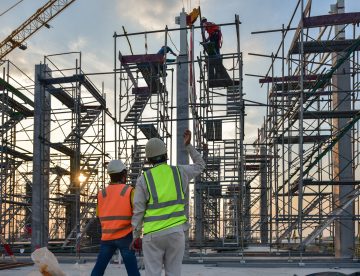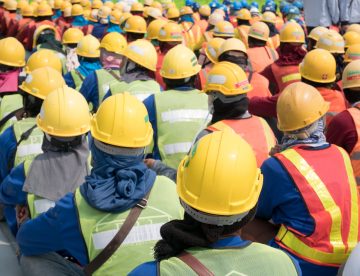
Research suggests that the average British construction worker consumes more than 4000 calories a day. That’s 1500 calories above the recommended daily intake for men and 2000 more than what’s recommended for women.
While the daily toll of physical labour means construction workers probably do need more fuel than the average person, the problem is that they’re often choosing unhealthy fast-food options which do not provide the best energy boost and have long-term health implications. Find out more in this week’s blog which includes some healthy alternatives for your key fuelling up times – breakfast and lunch.

As more than 400 tax workers join other professions in the recent wave of UK strike action, construction workers have reported serious issues in their attempts to communicate with the HMRC construction Industry Scheme (CIS).
Although online verification doesn’t appear to have been affected, callers to the CIS helpline have faced long delays with some reporting being cut off during their attempts to speak to someone. Find out more in this week’s blog.

Over a quarter of a million extra construction workers may be needed by 2026, according to the latest Construction Skills Network report. That’s over 53,000 new recruits per year for the next five years!
Published annually by the Construction Industry Training Board (CITB), the report looks into the UK’s construction economy and makes key predictions about what will happen in terms of labour/ skills needs over the coming years.
Check out this week’s blog for more details of what this year’s report had to say plus what it means for the sector and our region.

The summer holidays – a time when, like many others, people working in construction often disappear for a while (on their holidays or for family visits). But, did you know that, in the UK and for various reasons, more than half of people don’t take their full holiday entitlement? The problem, however, is that such efforts can be counter-productive as taking a break actually offers all kinds of benefits, both to the individual and the companies they work for. This week’s blog outlines the key points.

Like many other work environments, construction involves several layers of supervisory and management roles, many of which are taken up by people who have worked their way up the ranks. While that’s a great example of how hard work and loyalty can be rewarded, it also means that often people without any formal management or leadership training are having to manage and lead. As one of the trickiest aspects of managing other people is giving feedback (both praise and criticism), in this week’s blog, we’re sharing five tips which could help you master this skill.

A few weeks ago, we reported on some aspects of the UK budget which are likely to have an impact on construction. One thing we didn’t spot was Chancellor Rishi Sunak’s announcement of a new Taxpayer Protection Taskforce which is set to investigate those who make fraudulent claims through government COVID support schemes such as furlough and the Self Employment Income Support Scheme (SEISS). In this week’s blog, we’re taking a closer look at what this taskforce is set to do and explore whether there is a problem in construction with some workers choosing grants over tools.

To succeed in construction today and over the coming decades, the workforce needs to think about a continuous skills upgrade. We’re not only talking about the technical skills or upgrades required by particular trades. For anyone working in construction to make a leap from ‘good’ to ‘great’ performance, there are a host of other skills and knowledge that should be also nurtured. This week’s blog includes three steps which construction companies can use to encourage a culture of life-long learning plus some great examples of the online training options available.

As the country moves into a third national lockdown, many people will be keeping their cars firmly on the drive while they stay at home/ work from home but this will not be the case for construction workers who are recognised by government as ‘essential to keeping the country operating’ and will therefore continue to be on the road. With adverse weather and darker days, it’s vitally important to know how to prepare for any journey and how to adapt to changing conditions.

Increased workloads, rising stress levels, imbalances caused by remote working, untaken leave and the risk of burnout. These are all issues which are affecting many workers as a result of the pandemic. If you’ve not taken much of a breather this year, why not use the Christmas break as an opportunity to truly switch off, relax and unwind. Read on for some tips on how to do just that.

